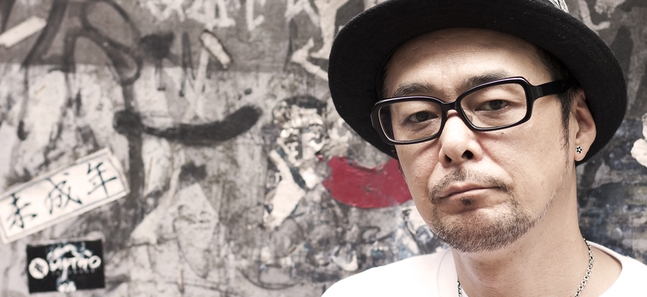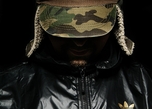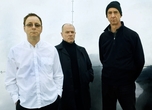DJ Krush: the interview
On jam sessions, Serato and the why the shakuhachi is cool

Posted: Tue Jul 26 2011
Part one | Part two
I'm totally ignorant about these things, but I'm curious: when you're doing a session with a band, how do you choose which records you're going to use?
If you're just doing scratching, it's not very interesting. You could play a trumpet sound or something, but if it's not in the same key as the rest of the band it's going to sound nasty. I'm using [DJ software] Serato now, so I'll have everything organized in folders according to what key they're in: a cappella vocals, synthesizers, all kinds of things, arranged by key.
That's pretty hardcore.
Yeah's, it's hardcore. Say, if there's a bass solo, I can find a bass record in the same key, and have a session.
When did you start using Serato?
I think it was about three years ago. After 9/11, taking luggage on planes became a real hassle, so I wanted to change how I did things. My records were getting stolen, too.
So you don't used vinyl at all?
Serato's vinyl-style, but I don't use analog records for gigs any more.
Don't you miss it?
Oh, I still play it at home. (Laughs) When you play at big festivals, you sometimes get feedback issues with vinyl. That's not a problem with Serato.
You're going to be playing a seven-hour set at Liquidroom. How do you go about preparing for that?
If people are there for seven hours, that's a real challenge. It'd suck if they got bored and went home. What should I do – sing? (Laughs) Ideally, I'd like to make sure people don't get bored, and cover a lot of bases. I have to give it some more thought. Seven hours is a long time, isn't it?
You remixed a lot of your tracks for Stepping Stones: The Self-Remixed Best in 2006, but how does it feel when you go back to that old material?
I don't think the tracks are perfect. They felt perfect when I was making them, but now I'll think, 'Oh, I wish I'd done it a bit more like this…' There's no end to it.
Do you ever feel you couldn't have made the same track today?
Yeah, there are lots of tracks that I don't think I could've made now. Say, I had a particular feeling when I was making something, so unless I got in the same state, I wouldn't be able to make it again. There's no going back. Remixing myself was really tough. They're my tracks, so I know them inside-out.
You've got a reputation as a bit of a perfectionist, but have you ever tossed a track off really quickly?
No, that's never happened. I always work on things carefully – I don't want to have any regrets further down the line. That's been my style from the beginning. I can't change that: I'm just really particular.
When you're playing with a band, though, you don't have time to do that. Is that part of the appeal?
Yeah, it's part of striking the balance. If I just made tracks, it would wear me down after a while, so playing in a free session with a band is healthy. It gives me new ideas, too – it's a good balance. It's important to do both.
With your most recent album, you were incorporating a lot of traditional Japanese instruments. Why is it that when people want to express Japanese tradition in their music, they have to reach so far back? Hasn't Japan come up with anything distinctive since then?
Well, there's enka, or Japanese blues… After the war, when Japan was defeated by America, there was an influx of Western culture. Japanese people started playing rock music: there were Japanese bands playing rock at the US military bases, then you had Finger 5 copying the Jackson 5. It all got mixed up. When I was a kid, I wasn't listening to shakuhachi. I didn't grow up with traditional music: the radio played Japanese kayokyoku, rock, or American music on [AM station] FEN. If you want to talk about 'pure' music, then it's probably shakuhachi, shamisen… It's a tricky question. Did I actually answer it?
I was trying to think of hip-hop artists in the West who were doing the same thing. If it was in England, they'd be using Morris dancing or old folk or something…
Does nobody try to sample it and make a track?
It'd probably be a bit naff.
When I started doing hip-hop, I didn't think shakuhachi or shamisen were cool. But as I went around the world, and heard music from lots of different countries, I realized the shakuhachi expressed a really Japanese atmosphere, and I started to feel it was cool: it was something that only we could do. That's what gave me the confidence to try it. When you come back to your own country after a long trip overseas, you can recognize these things.
So if you hadn't done so much work overseas…
I'd probably still just be playing hip-hop.
Last of all, I wanted to ask a little about JAG Project. When did that start?
JAG was… [Discusses for a while with his manager] I honestly don't remember when it started. I'm not at the centre of the action, I'm just participating in it. I like that style of getting involved in a lot of different countries, with one core purpose – when it's not about genres, it's just about doing something. We were focussing on Africa, but given what's happened in Japan, we've shifted the focus here recently. I think, if you can achieve something with music, then…
Do you think music can change the world?
I don't know about changing the world, but it can cross borders and touch people without any need for a passport. That's a really important thing. Maybe it'll go on to inspire those people to take action. I don't know about changing the world, but I want to make music that can move people.
DJ Krush 20th Anniversary, Liquidroom, July 29
Part one | Part two
Tweets
- About Us |
- Work for Time Out |
- Send us info |
- Advertising |
- Mobile edition |
- Terms & Conditions |
- Privacy policy |
- Contact Us
Copyright © 2014 Time Out Tokyo














Add your comment